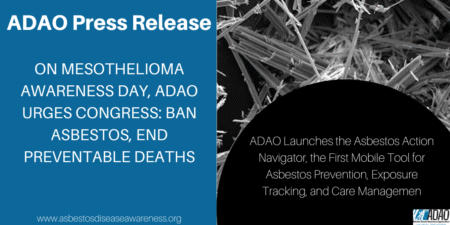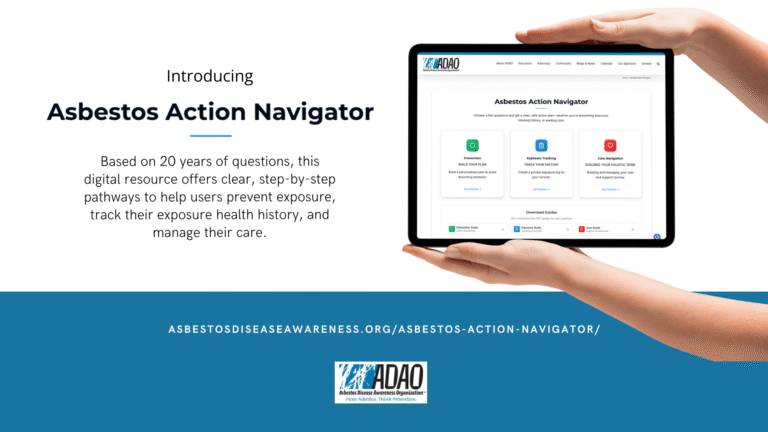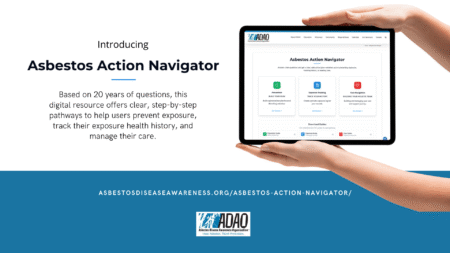FOR IMMEDIATE RELEASE
September 26, 2025
ON MESOTHELIOMA AWARENESS DAY, ASBESTOS DISEASE AWARENESS ORGANIZATION URGES CONGRESS: BAN ASBESTOS, END PREVENTABLE DEATHS
Check out our newly developed Asbestos Action Navigator for all your asbestos prevention and education needs.

Mesothelioma Awareness Day is Friday, September 26. Mesothelioma most often develops in the lining of the lungs, called the pleura, but it can also occur in the abdominal lining (peritoneum), the tissue surrounding the heart (pericardium), and the tissue around the testicles (tunica vaginalis). Common symptoms include chest pain, shortness of breath, abdominal swelling, and unexplained weight loss. According to the Centers for Disease Control (CDC), most cases are caused by asbestos exposure.
Each year in the United States, nearly 3,000 Americans die from mesothelioma — part of the 40,000 people who die from asbestos-related illnesses every year in the United States.
“Every 13 minutes, we lose someone in the United States to an asbestos-caused disease such as mesothelioma. These deaths are preventable. The surest way to end this crisis once and for all is for Congress to pass the Alan Reinstein Ban Asbestos Now Act,” said Linda Reinstein, President and Co-Founder of ADAO and widow of the bill’s namesake.
“While promising research continues, prevention remains the only cure for asbestos-related diseases. Drawing on two decades of community questions, this new digital resource offers clear, step-by-step pathways to help users prevent exposure, document their exposure history, and manage care. With prevention at the forefront, we are proud to launch the Asbestos Action Navigator, a tool designed to deliver life-saving information directly to the public’s fingertips and help keep communities safe from dangerous asbestos exposure,” she announced.
The Alan Reinstein Ban Asbestos Now Act would:
- Prohibit asbestos manufacturing, processing, use, and distribution in commerce of all forms of commercial asbestos and asbestos-containing products.
- Close gaps left by EPA’s 2024 chrysotile asbestos rule.
- Establish durable protections not subject to shifting administrative or judicial challenges.
The bill is co-led in the House by Rep. Suzanne Bonamici (D-OR) and Rep. Don Bacon (R-NE), with Senator Jeff Merkley (D-OR) as the lead sponsor in the Senate (see S.2811 and H.R.5373).
The Asbestos Action Navigator is the first mobile tool dedicated to asbestos prevention and care management. The free tool builds a personalized prevention plan, logs possible exposures confidentially, and supports those diagnosed. With checklists, safety guidance, and community connections, it provides essential resources for people renovating older homes, monitoring health risks, or navigating a diagnosis.
Asbestos exposure causes lung, laryngeal, and ovarian cancers, as well as chronic respiratory diseases such as asbestosis. Despite known risks, asbestos remains present in millions of older homes, schools, and buildings, as well as in some consumer and personal care products. Disturbing asbestos-containing materials releases microscopic fibers that endanger workers, families, and communities. Asbestos exposure may also occur through household contact or residence near natural asbestos deposits or former mines, according to the CDC.
Congress has the opportunity to end asbestos use and protect future generations from preventable disease and death. ADAO calls on lawmakers to mark Mesothelioma Awareness Day by passing ARBAN and invites the public to explore the Asbestos Action Navigator so they can protect themselves and their loved ones from asbestos exposures.
###
Full Letter To Congress
Date: September 26 — Mesothelioma Awareness Day
Subject: Support for the Alan Reinstein Ban Asbestos Now (ARBAN) Act of 2025
On behalf of the Asbestos Disease Awareness Organization (ADAO), I respectfully request your attention and support in recognizing Mesothelioma Awareness Day on September 26. This day calls attention to the devastating consequences of asbestos exposure and underscores the urgent need for strong public health protections.
Last week, the Alan Reinstein Ban Asbestos Now (ARBAN) Act of 2025 (S.2811 and H.R.5373) was reintroduced. The bill is co-led in the House by Rep. Suzanne Bonamici (D-OR) and Rep. Don Bacon (R-NE), with Senator Jeff Merkley (D-OR) as the lead sponsor in the Senate.
To mark Mesothelioma Awareness Day, ADAO launched the Asbestos Action Navigator, the first mobile tool designed to help the public prevent exposure, track potential risks through a confidential log, and access care management resources after diagnosis. The Navigator provides practical checklists, safety guidance, and connections to support communities. It is free, accessible, and ready to be shared with your constituents to help protect them and their families.
Asbestos exposure is a multi-disease hazard. In addition to mesothelioma, it causes cancers of the lung, larynx, and ovaries, and chronic respiratory diseases such as asbestosis. Eliminating exposure is the only effective way to prevent these diseases.
The scope of the U.S. asbestos crisis:
- Nearly 3,000 Americans die from mesothelioma each year.
- Approximately 40,000 Americans die annually from asbestos-related diseases.
- Between 2004 and 2024, the U.S. imported more than 17,500 metric tons of asbestos.
ARBAN would:
- Prohibit the manufacture, processing, use, and distribution in commerce of all forms of asbestos and asbestos-containing products.
- Close the gaps left by EPA’s 2024 chrysotile asbestos rule.
- Establish durable protections not subject to shifting administrative or judicial challenges.
The United States remains the only industrialized nation that has not fully banned asbestos. With thousands of preventable deaths each year, the need for legislative action is clear. While promising treatments are under study, prevention remains the only cure.
I urge you to honor Mesothelioma Awareness Day by supporting ARBAN and by sharing the Asbestos Action Navigator with your constituents as a trusted prevention and care resource.
Thank you for your leadership and commitment to protecting public health. I look forward to working with you to eliminate asbestos exposure risks and safeguard future generations.
Sincerely,
Linda Reinstein, President and Co-Founder, Asbestos Disease Awareness Organization (ADAO)


